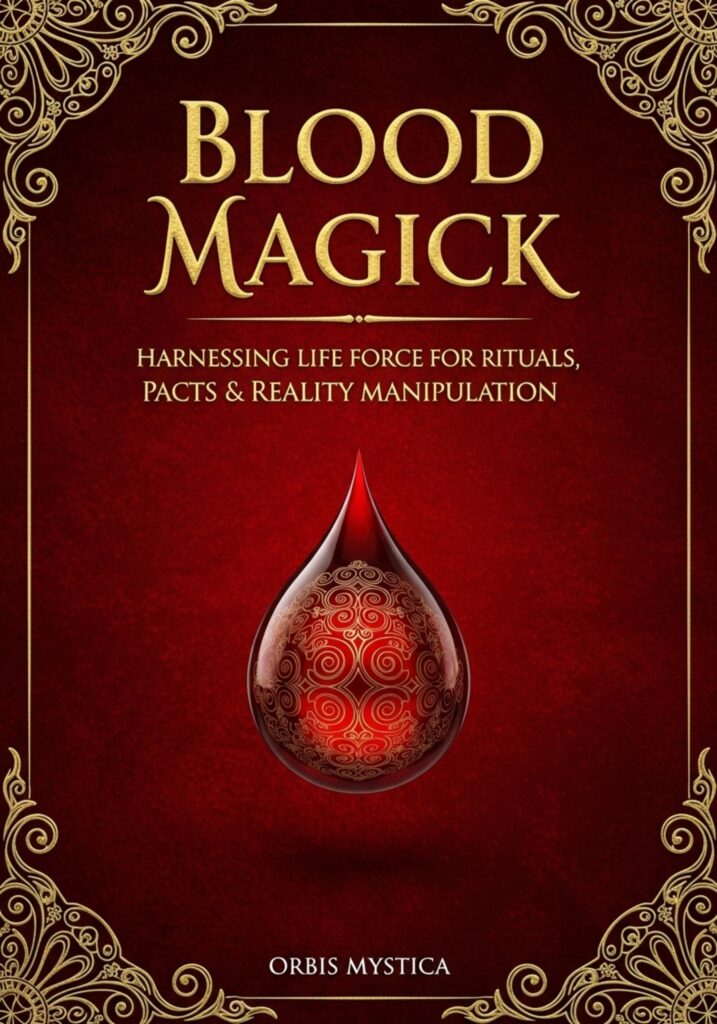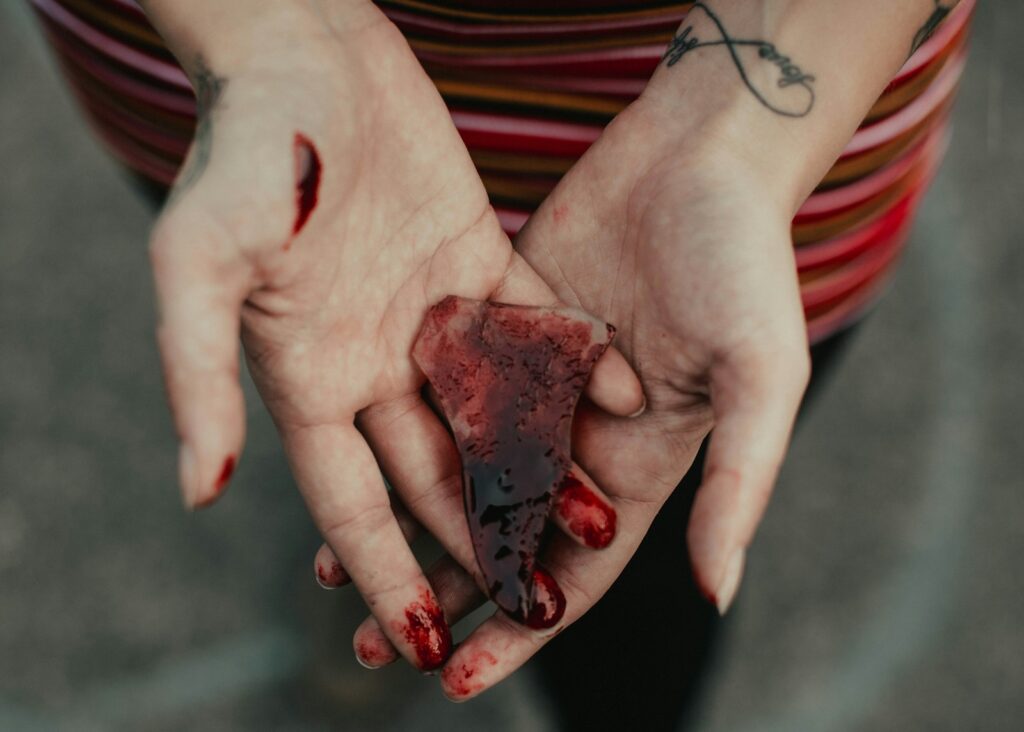Blood magick is one of the oldest and most visceral forms of ritual practice. It is also one of the most misunderstood. To outsiders, it conjures images of horror films or medieval superstition. To practitioners, it is something far more serious: the direct use of life-force as a current of power. Blood is not symbolic — it is literal vitality, charged with memory, lineage, and potency. It is the essence that carries both danger and sanctity.
Because blood magick is potent, it demands more than technique. It demands ethics. Without boundaries, consent, and safety protocols, blood work becomes reckless at best, predatory at worst. To work with blood is to enter into a covenant of responsibility. Every drop offered must be deliberate, consensual, and safeguarded by a framework that protects both practitioner and spirit.
The Nature of Blood as Magickal Current
Blood is not inert. It carries genetic memory, emotional imprint, and energetic charge. Within occult traditions, blood is considered the densest, most binding form of offering — more intimate than incense, more binding than words, more permanent than intention alone.
Because of this, blood magick can anchor spells with unmatched force. A sigil sealed with blood binds deeper. A pact signed in blood is harder to break. An offering of blood to spirit is received with gravity. But this same power that makes blood effective also makes it volatile. It is irreversible once given.
This irreversibility is why ethical protocols matter. Once you give blood, you cannot take it back. It becomes part of the ritual field.
Boundaries: Defining the Container
The first ethical layer of blood magick is boundary. Boundaries prevent magick from becoming parasitic, exploitative, or uncontrolled.
Personal boundaries mean knowing exactly how much blood you are willing to give, under what circumstances, and for what purpose. This is not about fear but sovereignty. If you bleed without boundaries, you invite depletion, obsession, and unintended entanglement.
Ritual boundaries mean creating a container that defines where the energy begins and ends. Circle casting, protective wards, or sacred space delineation all serve as boundaries. Without them, blood becomes an uncontrolled current, leaking into spaces and relationships you never intended to affect.
Spiritual boundaries mean choosing carefully which entities or forces receive your blood. Not every spirit deserves that level of intimacy. Blood binds. To offer it casually is to give away a key to your sovereignty.
Consent: The Cornerstone of Ethics
Blood magick without consent is abuse. This is non-negotiable. Consent must exist on every level.
- Self-consent: Never allow yourself to be pressured into giving blood in ritual. If you do not feel fully aligned, do not proceed. Your hesitation is your inner warning system.
- Other-consent: Never use another’s blood without explicit permission. This includes even trace amounts — hair, saliva, menstrual blood, or accidental cuts. To take without asking is theft of life-force.
- Spirit-consent: Even spirits must be asked. Blood is not a currency to be thrown around. Before offering, confirm the spirit accepts, desires, or requires such an offering. Some traditions explicitly forbid blood offerings to certain entities because of how binding they are.
Without consent, blood magick crosses into coercion. And coercion poisons the current.
Safety Protocols: Protecting Body and Spirit
Ethical blood magick is not only about morality. It is also about physical and psychic safety.
Physical protocols include using sterile tools, controlling how much blood is taken, and knowing your limits. Bloodletting should be minimal — drops, not gushes. Infection risk must be eliminated. Never share blades. Never compromise your health in pursuit of power.
Energetic protocols include cleansing tools before and after, closing the ritual properly, and grounding afterward. Blood calls in intensity — grounding ensures you are not left raw or open.
Psychological protocols mean working with integration. Blood magick can stir primal emotions — fear, exhilaration, ecstasy. Without processing, these states can destabilize. Journaling, meditation, or speaking with trusted peers ensures you integrate rather than spiral.
Why Ethics Strengthens Magick
Some imagine ethics weakens blood work, watering down its potency. The opposite is true. Ethics strengthens the current because it creates clarity. When your boundaries are intact, your consent deliberate, and your safety ensured, the offering becomes sharper. Spirits respect sovereignty. The universe responds to integrity. Blood given with clarity carries more power than blood given recklessly.
Ethics are not restraint for their own sake. They are architecture for potency.
Common Ethical Violations in Blood Magick
To understand why protocols matter, consider the violations:
- Blood given under duress. This generates bindings of trauma rather than empowerment.
- Uninvited blood offerings to spirits. This can create parasitic attachments.
- Use of another’s blood without consent. This is psychic violation, akin to assault.
- Over-giving. Bleeding excessively or too frequently leads to depletion, weakness, and instability.
- Improper closure. Failing to close ritual space can leave energy leaking, drawing unwanted entities.
Every violation leaves scars in the energetic body. Many occultists spend years untangling consequences from poorly handled blood work.
Blood as Covenant, Not Commodity
One of the most profound ethical shifts in blood magick is moving from seeing blood as commodity to seeing it as covenant. Blood is not a transaction — it is relationship. When given, it seals a vow between you, the work, and the spirit world.
This means every offering must be worthy of the sacrifice. Use blood for initiations, life-changing workings, deep pacts — not casual spells. Treat it as the sacred sacrament it is.
The Shadow of Blood Magick
The taboo around blood exists for a reason. Cultures fear it because it exposes our mortality and power simultaneously. This fear has often led to projection — tales of “dark sorcerers” abusing blood for domination. While those tales are exaggerated, the shadow is real: blood magick can be exploited by those seeking control over others.
This is why ethical frameworks are not optional. They protect against the shadow side — both in others and in yourself. Anyone who tells you ethics do not matter in blood work is revealing their own hunger for power without accountability.
Toward a Culture of Sovereign Practice
Blood magick will always remain controversial. But for those who practice, cultivating a culture of sovereignty, consent, and safety ensures its power is wielded wisely. In doing so, practitioners transform blood work from something feared into something sacred — a practice rooted in respect rather than transgression.
The future of blood magick depends on this shift. To build a culture of ethical practice is to ensure the current flows without corruption. To treat blood as covenant rather than commodity is to align power with integrity.
The Covenant of Life-Force

Blood magick is neither inherently dark nor inherently light. It is raw, primordial, and binding. Its danger is also its sanctity. Boundaries ensure you remain sovereign. Consent ensures no violation occurs. Safety protocols ensure the work does not consume the worker.
When practiced ethically, blood magick becomes one of the most sacred paths of power — not exploitation, but covenant; not recklessness, but reverence.
This is the heart of Blood Magick: Harnessing Life Force for Rituals, Pacts & Reality Manipulation — to reveal both the potency and the responsibility that comes with wielding the essence of life itself.

